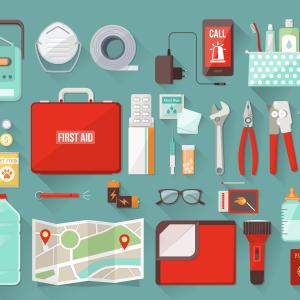
Are You Ready for Unexpected Events?
This month marks the 15th annual National Preparedness Month. It’s a time when the Federal Emergency Management Agency (FEMA) encourages everyone to embrace planning and be ready to manage potential crises.
Some emergencies may leave you confined within your home, without power or water. In other cases, you may need to evacuate your home, taking essential supplies with you quickly.
No matter what situation comes your way, you can feel empowered and ready to take action in a matter of minutes.
Experts recommend gathering all essential supplies in one spot. You can assemble items into a large tub that’s easy to move to your car. Or, pack your supplies into easy-to-carry backpacks for each member of your household.
Hopefully, you will never need an emergency 72-hour kit. But just in case you do, here’s how to be ready!
Basic 72-Hour Kit
Critical items include:
- Three gallons of water, per person
- Three days of non-perishable food, plus snacks
- First aid kit, including basic items plus essential over-the-counter drugs and prescription medications
- Personal hygiene supplies
- An extra pair of glasses or contact lenses
- Toilet paper and wet wipes
- A change of clothes (layers work best) plus underwear and socks
- A sturdy pair of shoes that are comfortable for walking
Essential Tools
These supplies can be extremely beneficial during emergencies:
- Flashlight and extra batteries
- Matches or lighter
- Knife
- Manual can opener
- NOAA weather radio
- Emergency power bank and charging cables
- Copies of essential keys (home, work, vehicles, etc.)
Consider Special Needs
If your household includes infants, small children, or aging adults, you may also want to include several of these items:
- Formula and baby food for infants
- Favorite snacks and treats
- Individual hygiene products, such as diapers (infant or adult) and topical skin ointments
- An on-body infant carrier that will free up your hands while keeping baby close
- Portable toys, games, books, etc. (non-electric options, if possible)
Don’t Forget Your Pets
Accommodate dogs, cats, and other pets with:
- Three days of food and water
- Extra collar (with ID tags) and leash
- Favorite toy(s), treats, and bedding
- A pet-specific first aid kit, including any prescription medicines
- Kennel or crate, if possible
Keep Things Fresh
Be sure to check the status of your food twice a year. For longer expiration dates, it may be preferable to purchase items with an extended shelf life, including freeze-dried food.
In most states, the clocks change in the spring and the fall. Use this as a reminder to check your kits.
Important Legal and Financial Data
If disaster strikes, you may be able to save untold hours of aggravation if you add copies of your most important legal and financial documents to your supplies.
Whether you opt for physical copies or a digital thumb drive, keep these vital documents safe and dry in a sealed baggie tucked into your travel bag.
Prepared, Not Scared
In an emergency, you may not have time to collect the things you are most likely to need. Let’s face it. Your mind will be on other things.
A 72-hour supply kit, ready and waiting, will reduce your stress and ensure that everyone has what they need most, so you can rest easy.
